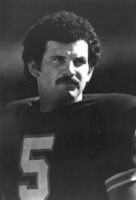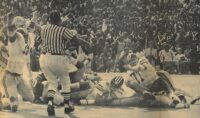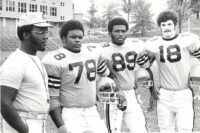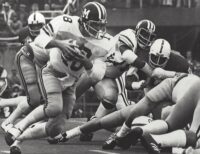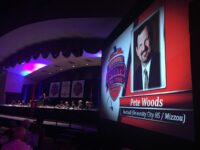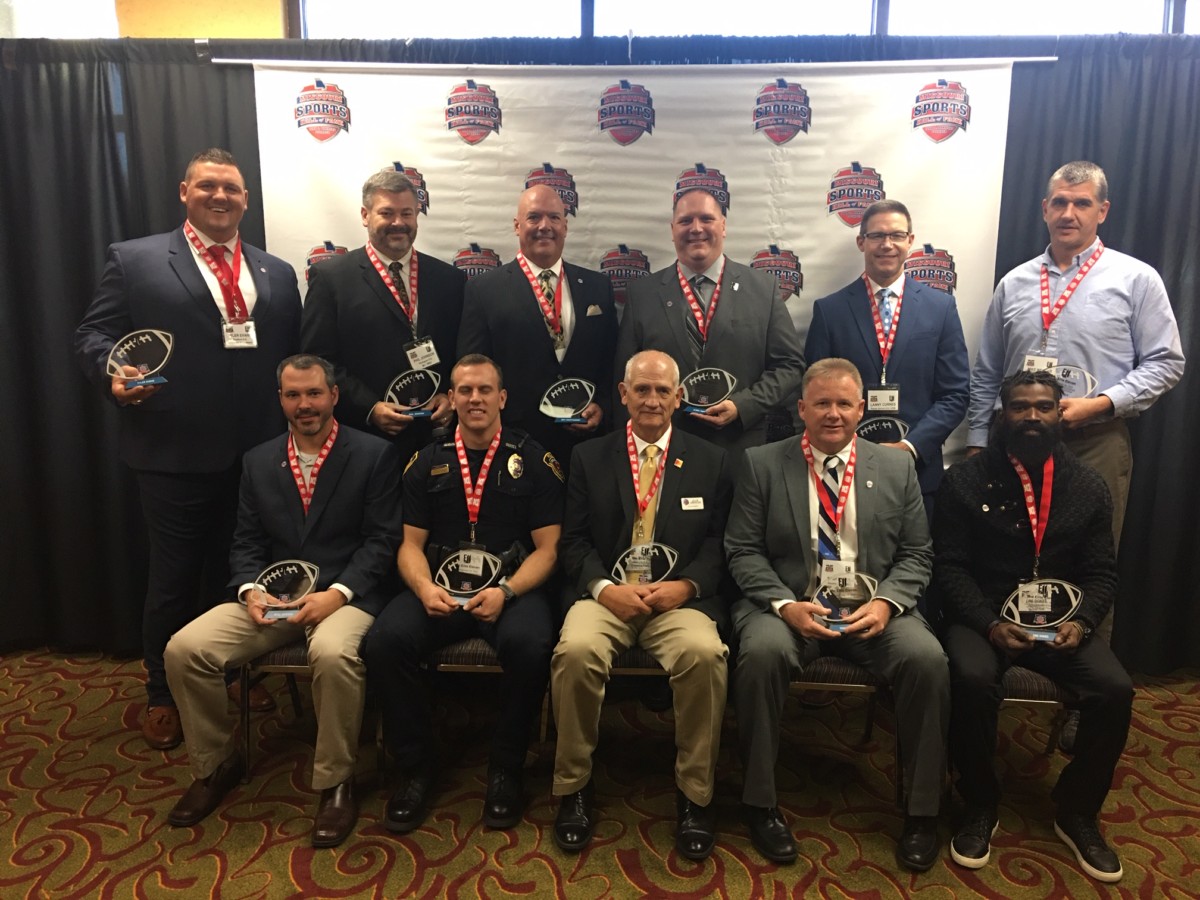Inductees
Pete Woods
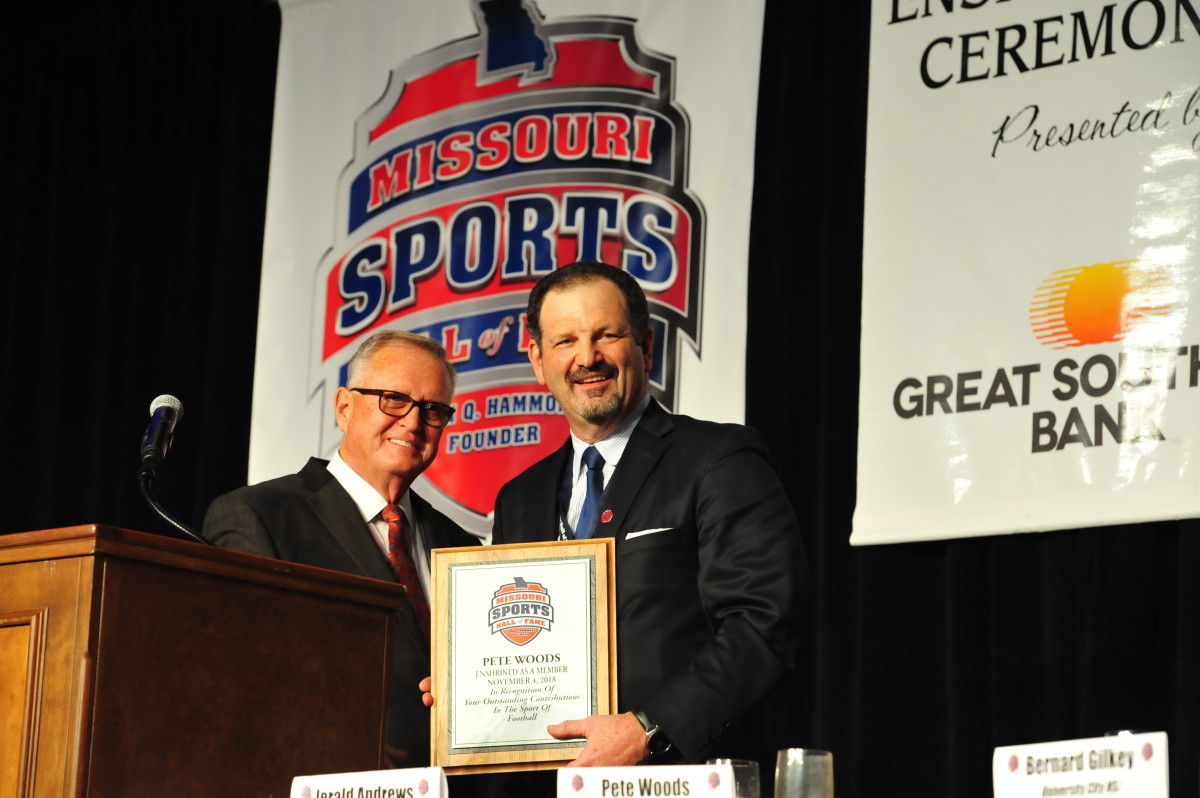
The greatest upset in University of Missouri football history? For many, it remains Sept. 25 1976, a last-minute, 22-21 victory on the road against none other than Woody Hayes’ No. 2-ranked Ohio State Buckeyes.
The man who engineered the offense that afternoon remembers it – and the night before – like it was yesterday. Who can blame him? Pete Woods was summoned from the sidelines to make his first career start after 2 ½ quiet years on the roster.
“The Friday night before the Ohio State game, we’re in the hotel – and this was before ESPN – and looking for sports highlights on the local news,” Woods recalled. “We flip to a channel, and the sports guy says, ‘the Buckeyes came in 14-point favorites but, with Woods starting at quarterback instead of Steve Pisarkiewicz, who is out due to injury, they’re now favored by 35 points.’”
“Well, I remember thinking, ‘If I didn’t have enough motivation, I do now,’” Woods said.
Gaining the last laugh was part of a memorable athletic career that has led to the Missouri Sports Hall of Fame, which proudly inducted Woods with the Class of 2018.
That season, Woods not only toppled Ohio State – he scored the winning 2-point conversion – but later helped upset No. 3 Nebraska in Lincoln.
Naturally, competition was fierce for the starting role upon Pisarkiewicz’s return. With 1976 being an election year, Jim Sterling wrote a story titled “Pete Woods for President.” Supporters of an outdoors ballot measure had bumper stickers that read “Woods and Wildlife No. 1” but some Tigers fans cut off the middle section, leaving the message as “Woods No. 1.”
In his first two years on campus, Woods was better known as a baseball player, compiling a 9-1 pitching record for the seventh-ranked Tigers in 1976.
However, he had been a big-time football recruit out of University City High School, where he was a three-sport athlete, earned St. Louis High School Football Player of the Year, All-State in baseball and football and numerous academic awards.
But when football powers Michigan, Notre Dame and Southern Cal came calling – and after Major League Baseball scouts approached – Woods chose to remain true to Mizzou.
His mother, state Sen. and Lt. Gov. Harriett Woods, even lobbied for her alma mater, Michigan.
Becoming a Tiger had long been near and dear to his heart. His father was Jim Woods, a Moberly native, longtime editor of the St. Louis Post-Dispatch, the National President of the Newspaper Guild and a 1937 graduate of Mizzou’s School of Journalism. He took Pete to at least one Tigers game a year.
“I was recruited by everybody, but my heart was in Columbia,” Woods said. “I’ve bled black and gold as long as I can remember.”
Mizzou was redshirting Woods in 1976 but summoned him into duty against Ohio State.
The Tigers trailed 21-7 at halftime but pulled within 21-20 with 12 seconds left on Woods’ 12-yard TD pass to Leo Lewis. The first 2-point conversion pass fell incomplete, but Ohio State was whistled for a penalty.
Now, from the 1 1/2-yard line, Woods carried two tacklers into the end zone. He was forced to hold onto the ball after the Buckeyes covered Curtis Brown, the pitch man on the option.
A 35-point underdog, eh?
His 1976 season later included the upset of Nebraska in Lincoln, highlighted by his 98-yard TD pass to Joe Woods — the longest in Big 8 Conference history.
“He was going against All-American corner Dave Butterfield and faked him out of his shoes with a great move before catching the ball at midfield,” Woods said. “There were over Huskers fans 80,000 and the place just went dead silent.”
Woods was a three-year letterman and earned Second Team All-Big 8 in 1976 and 1977, despite limited playing time as a senior due to injury.
He was the 104th selection in the 1978 NFL Draft and played parts of four seasons with the Kansas City Chiefs, Denver Broncos, Cincinnati Bengals and Miami Dolphins.
Woods later earned a law degree from Washington University and practices in St. Louis, but fans still remember him.
“Thankfully, memories of any bad sports moments have faded more quickly than have the victories,” Woods said. “Forty some years later, people still remember upsets and other football successes.”
“I treasure my connections to my great teammates, coaches and fans,” Woods added. “Those close contacts probably don’t exist if I had chosen to play elsewhere. I’m proud to be known as a Missouri guy.”
